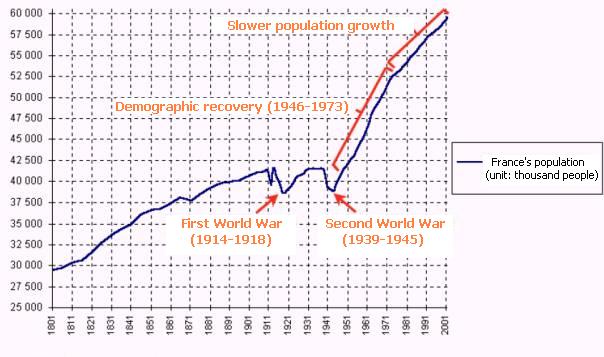
In 1990, the population of Western Germany (62 million) and France (58m) was within a whisker.
Then reunification happened – and Germany suddenly had 80 million.
In 2050, France’s population could reach around 80 million and overtake Germany as the EU’s most populous state.
Then reunification happened – and Germany suddenly had 80 million.
In 2050, France’s population could reach around 80 million and overtake Germany as the EU’s most populous state.
France’s demographics – current & historical – will never cease to amaze me.
France was one of a few countries to kinda miss out on the massive population increase of the 19th century. And it got worse until 1950.
But then, when everyone else slowed down, bonjour la France!
France was one of a few countries to kinda miss out on the massive population increase of the 19th century. And it got worse until 1950.
But then, when everyone else slowed down, bonjour la France!

But it gets even weirder if you go further back. During the Middle Ages, a quarter of Europe’s population was French.
That’d be 185 million people today – three times France’s actual population!
That’d be 185 million people today – three times France’s actual population!
Now you may say “185 million French, that’s crazy!”
Well, actually, if France was as densely populated as Germany already is today (232/km2), it would have 148 million inhabitants.
If it was as densely populated as the UK (270/km2), France would have 173 million citoyens.
Well, actually, if France was as densely populated as Germany already is today (232/km2), it would have 148 million inhabitants.
If it was as densely populated as the UK (270/km2), France would have 173 million citoyens.
Which is to say, France is really weirdly underpopulated for a big western European country with plenty of fertile land.
And it basically began to grow really slowly already around 1500. From then until 1800, the population increased just by 50%. Another 30% followed until 1900.
And it basically began to grow really slowly already around 1500. From then until 1800, the population increased just by 50%. Another 30% followed until 1900.
To put that into perspective.
France England Germany
1500: 20m 2m 9m
1800: 30m 7.7m 22m
1900: 40m 30m 54m
France England Germany
1500: 20m 2m 9m
1800: 30m 7.7m 22m
1900: 40m 30m 54m
It also bears noting that England’s demographics are the crazy rabbit cousin to France’s tortoise.
England’s population almost quadrupled (+385%!) from 1500 to 1800 and then quadruped again (+390%) until 1900.
England’s population almost quadrupled (+385%!) from 1500 to 1800 and then quadruped again (+390%) until 1900.
That’s how, for French rulers, England went from “huh, that poor little island with their dorky Tudor kings” to “damn, those Brits are our toughest competitors in Europe and around the world!”
(And I know, Brits and English are not the same – but the power of Great Britain was unthinkable without England’s enormous population growth. Interestingly, Scotland’s population grew at similar rates, just from a lower base. Ireland’s growth instead was brutally capped.)
I also believe that the French Revolution’s universal appeals can be better understood in this context.
In 1789, when the Declaration of the Rights of Man and of the Citizen were proclaimed, France had 28 million inhabitants – still a 7th of Europe’s approx. 200 million.
In 1789, when the Declaration of the Rights of Man and of the Citizen were proclaimed, France had 28 million inhabitants – still a 7th of Europe’s approx. 200 million.
But more than that, they looked back on centuries being the largest and “central” European country. It seemed natural to deem to declare universal rights for all of Europe and all of humankind.
In comparison, the 13 American colonies had about 2.5 million inhabitants in 1776.
In comparison, the 13 American colonies had about 2.5 million inhabitants in 1776.
The way the French Revolution was seen compared to the American Revolution is a bit like U.S. elections might compare to Australian elections today.
*Of course* this is grossly simplifying, but it helps putting the respective sizes and centrality of the countries into context.
*Of course* this is grossly simplifying, but it helps putting the respective sizes and centrality of the countries into context.
Now, imagine that the U.S. population would grow over the next two-and-a-half centuries to about 640 million, but the Australian population would skyrocket to a fantastical 3.2 billion!
That’s what happened over the last 250 years or so with France & the US.
That’s what happened over the last 250 years or so with France & the US.
Lots of “ifs” which we can only speculate about, of course. But it helps to put historical events and trends into perspective, I feel.
In the meantime, studying France’s demographics will remain an abiding fascinating pastime.
Alors, vive la France et bonne nuit 🇫🇷🤗
In the meantime, studying France’s demographics will remain an abiding fascinating pastime.
Alors, vive la France et bonne nuit 🇫🇷🤗
• • •
Missing some Tweet in this thread? You can try to
force a refresh


